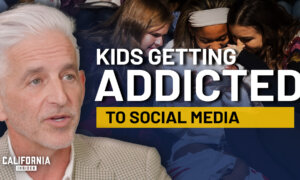Precious family heirlooms and physical traits are not the only things passed down from generation to generation.
A 25-year study published in 2024 followed families across three generations and found that empathy is a trait that endures over time and across relationships. The “empathy blueprints” we receive from our parents are paid forward, shaping how we connect with our friends and, later, how we nurture our children.
Amid an overwhelming abundance of parenting techniques, empathy may be parenting’s best-kept secret. It enables children and parents to gain perspective, emotionally tune in to others, and sustain meaningful, mutually generous relationships throughout life. Research like that in the book “Unselfie,” by Michele Borba shows empathy fosters forgiveness, altruism, generosity, and moral courage while predicting future happiness, success, health, and well-being.
Intergenerational Effects of Empathy
The quarter-century longitudinal
study, published in Child Development, demonstrated that mothers’ empathy toward their 13-year-olds predicted the teens’ empathy toward their close friends in adolescence—ages 13 to 19. These teens went on to become empathic parents, which predicted their own children’s empathy.
While previous research has linked parents’ and children’s empathy at specific moments in time, this study was the first to show that empathic parenting creates a ripple effect, influencing at least three generations down to grandchildren.
“Good parents teach their children important life skills, and empathy—particularly the ability to accurately ‘read’ other people—is among the most important of those skills,” William Ickes, social and personality psychologist and distinguished professor of psychology, told The Epoch Times in an interview.
Empathy is such an important skill because it facilitates meaningful social connection, which has serious implications for health and well-being.
In 2018, researchers discovered that preschoolers raised by empathic parents with strong emotional empathy had cortisol levels nearly one-third lower than those of their peers raised by less empathic parents.
Increased cortisol can lead to a variety of health problems, including immune suppression and deterred social adaptation. Additionally, the same study found that children with empathic parents experienced better emotion regulation, fewer headaches, and less anxiety and depression.
“We fail to realize how critical relationships are and how lonely we’ve become as a society,” educational psychologist and best-selling author Michele Borba said in an interview with The Epoch Times.
By instilling empathy in our children, we naturally shield them from the hazards of isolation and loneliness while also preparing them—and their children—for financial, academic, and leadership success.
The Emptiness Epidemic and Empathy Eroded
Empathy arises in infancy, nurtured through intimate face-to-face interactions. “The seeds of empathy are planted in our parent-child relationships, where our babies first learn trust, attachment, empathy, and love,” Borba stated.
However, the digital age disrupts these essential interactions. In a world mediated by screens, the conditions needed for empathy to flourish are eroding.
“You don’t find anything more except the surface of the person,” Borba said, emphasizing how our plugged-in worlds have diminished our capacities to connect meaningfully. “We just can’t read each other like we used to.”
“Self-absorption kills empathy, the foundation of humanity,” Borba wrote in her book “UnSelfie: Why Empathetic Kids Succeed in Our All-About-Me World.” Young people are becoming increasingly narcissistic, showing an increase in peer cruelty, academic cheating, weak moral reasoning, and poor mental health, Borba said.
“Our kids’ well-being is at stake, but so too is their empathy. As anxiety increases, empathy wanes: it’s hard to feel for others when you’re in ‘survival mode,’ and that’s the state of too many of our children. That creates a so-called empathy gap,” Borba wrote.
Borba said three sociological phenomena have contributed to the epidemic of loneliness and narcissism in recent decades: addiction to screens, the prioritization of children’s external achievements over their character, and the loss of virtuous role models.
Dimensions of Empathy
The word empathy comes from the German word “einfühlung,” which means “feeling into.” It’s usually understood as intuiting and inhabiting another person’s inner life, taking on another’s feelings as your own—to “walk in someone else’s shoes.” It is an important aspect of emotional intelligence.
The Enlightenment philosopher David Hume wrote, “The minds of men are mirrors to one another.” More than 250 years later, in the 1990s, Hume’s qualitative insights were quantified by seminal research on mirror neurons, which are special brain cells that activate when performing an action and when simply observing that action being performed.
Also known as “monkey-see, monkey-do” neurons, a 2022 study found that the same neurons that turn on when being touched automatically light up when seeing someone else being touched. For this reason, many people cringe while watching an unprepared classmate stumble through a presentation or instinctively grimace when a friend takes a hard fall during a soccer game. And this all happens unconsciously.
Neuroscience has traced two types of empathy, supported by independent brain networks: emotional empathy, which involves instinctively feeling and mirroring another’s feelings, and cognitive empathy, consisting of understanding another’s thoughts.
Sensitive parenting requires both forms of empathy. Emotional empathy allows parents to sense and respond to their infant’s pain as if they were feeling it themselves. Cognitive empathy enables parents to infer their infant’s thoughts, imaginatively decipher nonverbal intentions, and plan caregiving responses.
One particular application of empathy is everyday mind reading, or the attempt to glean the thoughts and feelings of others. For example, if a friend is unusually quiet during lunch, you may infer they are stressed about an upcoming exam. Ickes, who has studied this phenomenon for over twenty years and has largely contributed to its definition, says empathic accuracy is basically the extent to which everyday mind-reading attempts are successful.
“Empathic accuracy is a quintessential—indeed, perhaps the quintessential—aspect of emotional intelligence,” said Ickes. Emotional intelligence has direct consequences for various life outcomes, including academic performance, leadership success, and psychosomatic and physical health.
Don’t Forget Fathers
For decades, research on parenting empathy and secure attachment has centered almost entirely on mothers. However, a recent comprehensive
meta-analysis published in Psychological Bulletin in 2024 demonstrated that paternal sensitivity is just as critical as maternal sensitivity for fostering healthy child attachment. For mothers, sensitivity is linked to a 26 percent improvement in the strength of the bond with their children, and it is linked with a 21 percent improvement for fathers. The difference of only 5 percentage points indicates that both parents play a significant role in their children’s emotional security.
Further, another study found that soon-to-be fathers with greater cognitive empathy demonstrated more theory of mind (the ability to accurately understand others’ perspectives) and more effective bonding with their infants six months after birth. These findings underscore the importance of including fathers in conversations and future research about child attachment and emotional caregiving.
Empathy Is a Verb
What if you are a child raised by less empathic parents? Does this mean you are fated to a life of emotional confusion strewn with missed connections? Not necessarily.
“There’s always hope, but hope starts with awareness,” Borba said.
Empathy is not a fixed trait but a skill that can be cultivated during any phase of life as long as we reactivate our hearts, according to Borba. She recounted the story of Darren, a boy who suffered severe early trauma, was shuttled through numerous foster homes, and lacked any secure emotional attachment. He distrusted others so profoundly that he flinched at physical touch.
In a moment of connection with Evan, a difficult-to-soothe six-month-old infant, Darren’s sense of self was transformed. Recognizing Evan’s unease with touch—much like his own—Darren gently soothed and calmed Evan, experiencing the power of providing emotional sustenance for the first time. This moment allowed Darren to see himself in a new identity—not as unwanted but capable of providing love and connection.
Accordingly, Borba said empathy should be seen as a verb—something active and practiced through deliberate habits. Cultivating habits like recognizing emotions, understanding others’ perspectives, self-regulating painful emotions, and practicing kindness helps shift our focus from “me” to “we,” she said.
When returning Evan to his mother, Darren asked the question of a lifetime. “If nobody has ever loved you, do you think you could still be a good father?” Of course you can, Borba said.
Most importantly, it’s never too late. “All you have to do is reach out and feel. … How wonderful for [Evan] to give [Darren] a new sense of identity, so [Darren] sees himself as a person who could give back. What an enormous concept. You act how you see yourself to be.”
Empathic Rebirth and Enduring Emotional Legacy
“Empathy, if you do it a lot, changes your identity. You begin to see yourself as a caring person … as more resilient,” Borba said. Making a habit of practicing empathy is a transformative gift that forges new identities. It makes the giver and receiver happier and healthier and extends its impact beyond the present moment, affecting future generations.
“Your end product isn’t just empathy. Your end product is the compassion to give back,” Borba said. “We’ve become a society of materialism, so we want to get, as opposed to give, when the research says you’re happier giving, not getting.”
While we often hear about trauma being passed down through the generations, research such as this sheds light on the opposite phenomenon—the transmission of empathy—an essential psychological sustenance. By modeling active listening and nurturing our children’s emotional resilience, we shape not only our children’s futures but the emotional legacy of generations to come.
Empathy goes beyond sentimental embellishment. When we teach our children to see the world through another’s eyes, we’re planting seeds that grow into a meaningful and generative life.
“Empathy is like a superpower,” Borba said. “It’s a well-being and happiness factor that we’re clearly overlooking.”













